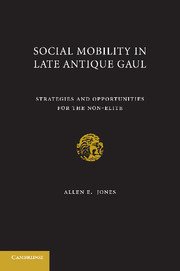Book contents
- Frontmatter
- Contents
- ACKNOWLEDGMENTS
- ABBREVIATIONS
- Gaul in the Late Sixth Century
- CHAPTER ONE INTRODUCTION: BARBARIAN GAUL
- CHAPTER TWO EVIDENCE AND CONTROL
- CHAPTER THREE SOCIAL STRUCTURE I: HIERARCHY, MOBILITY, AND ARISTOCRACIES
- CHAPTER FOUR SOCIAL STRUCTURE II: FREE AND SERVILE RANKS
- CHAPTER FIVE THE PASSIVE POOR: PRISONERS
- CHAPTER SIX THE ACTIVE POOR: PAUPERES AT CHURCH
- CHAPTER SEVEN HEALING AND AUTHORITY I: PHYSICIANS
- CHAPTER EIGHT HEALING AND AUTHORITY II: ENCHANTERS
- CHAPTER NINE CONCLUSION
- BIBLIOGRAPHY
- INDEX
CHAPTER SIX - THE ACTIVE POOR: PAUPERES AT CHURCH
Published online by Cambridge University Press: 18 December 2009
- Frontmatter
- Contents
- ACKNOWLEDGMENTS
- ABBREVIATIONS
- Gaul in the Late Sixth Century
- CHAPTER ONE INTRODUCTION: BARBARIAN GAUL
- CHAPTER TWO EVIDENCE AND CONTROL
- CHAPTER THREE SOCIAL STRUCTURE I: HIERARCHY, MOBILITY, AND ARISTOCRACIES
- CHAPTER FOUR SOCIAL STRUCTURE II: FREE AND SERVILE RANKS
- CHAPTER FIVE THE PASSIVE POOR: PRISONERS
- CHAPTER SIX THE ACTIVE POOR: PAUPERES AT CHURCH
- CHAPTER SEVEN HEALING AND AUTHORITY I: PHYSICIANS
- CHAPTER EIGHT HEALING AND AUTHORITY II: ENCHANTERS
- CHAPTER NINE CONCLUSION
- BIBLIOGRAPHY
- INDEX
Summary
And the Lord Himself in the Gospel said “The first will be last and the last shall be first” (Matthew 20:16). May divine mercy then shine with its love upon the poor, so that the small shall become great and the weak shall become coheirs with the One Son. For He has appointed the poverty of this world to heaven, where the empire of this world cannot reach, so that the poor peasant can go there when he that is dressed in purple cannot.
GREGORY OF TOURS, De Vita Patrum 5, praef.The sixth century witnessed virtually complete assimilation of Gallic bishoprics by socially prominent persons. A few zealous, reform-minded prelates – for example, Caesarius of Arles – tried to curtail other bishops' overt worldly aristocratic behavior such as overindulging at banquets and hunting. Others, among them Gregory of Tours, eschewed the familial survival strategy of producing progeny. But none touted sweeping social changes such as leveling society or eradicating the institutions of imprisonment and slavery. Instead, high ecclesiastics defended hierarchical principles and used clerical resources such as the cult of saints to perpetuate hierarchy. The previous chapter revealed how prisoners constituted a group of passive miserabiles for whom ecclesiastics were willing to secure liberation in exchange for loyalty. By inviting them to participate in the ritual of miraculous release, clerics reintegrated inmates into community life at the cost of indebtedness to a church establishment.
- Type
- Chapter
- Information
- Social Mobility in Late Antique GaulStrategies and Opportunities for the Non-Elite, pp. 213 - 249Publisher: Cambridge University PressPrint publication year: 2009



